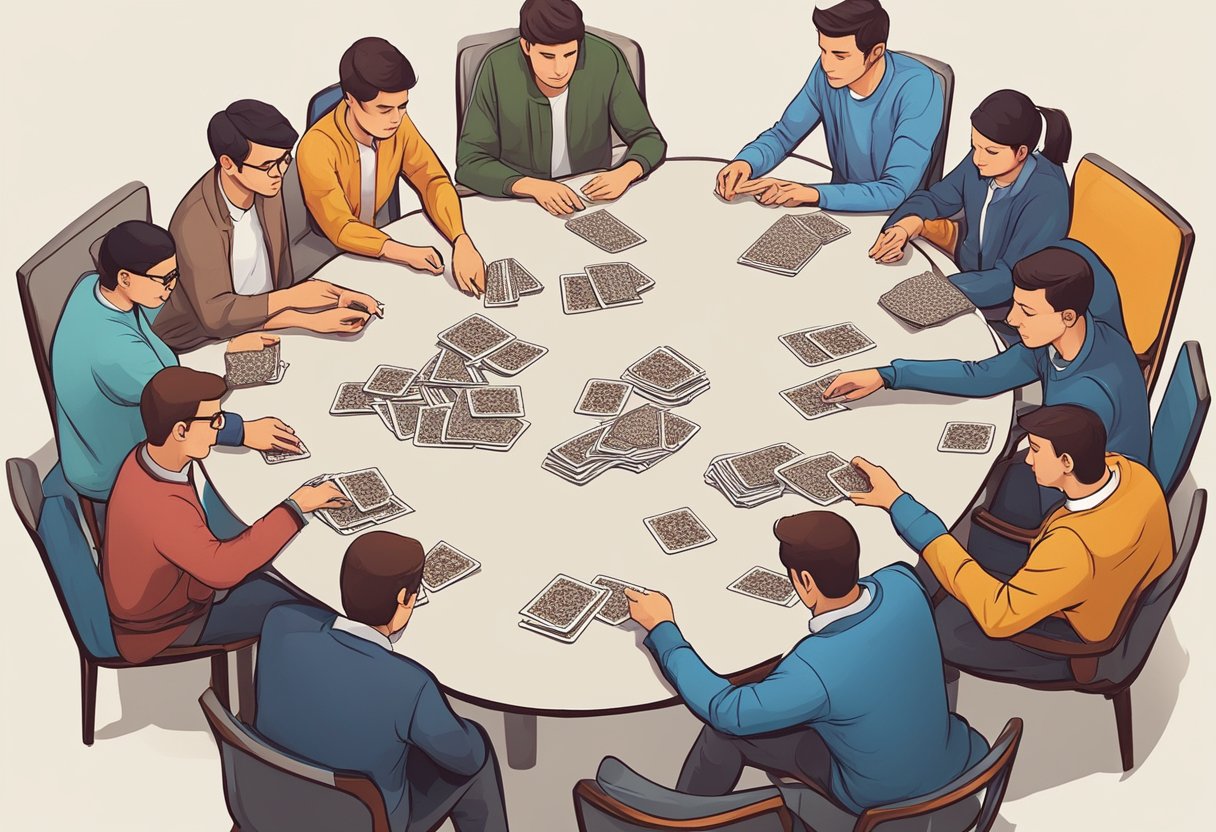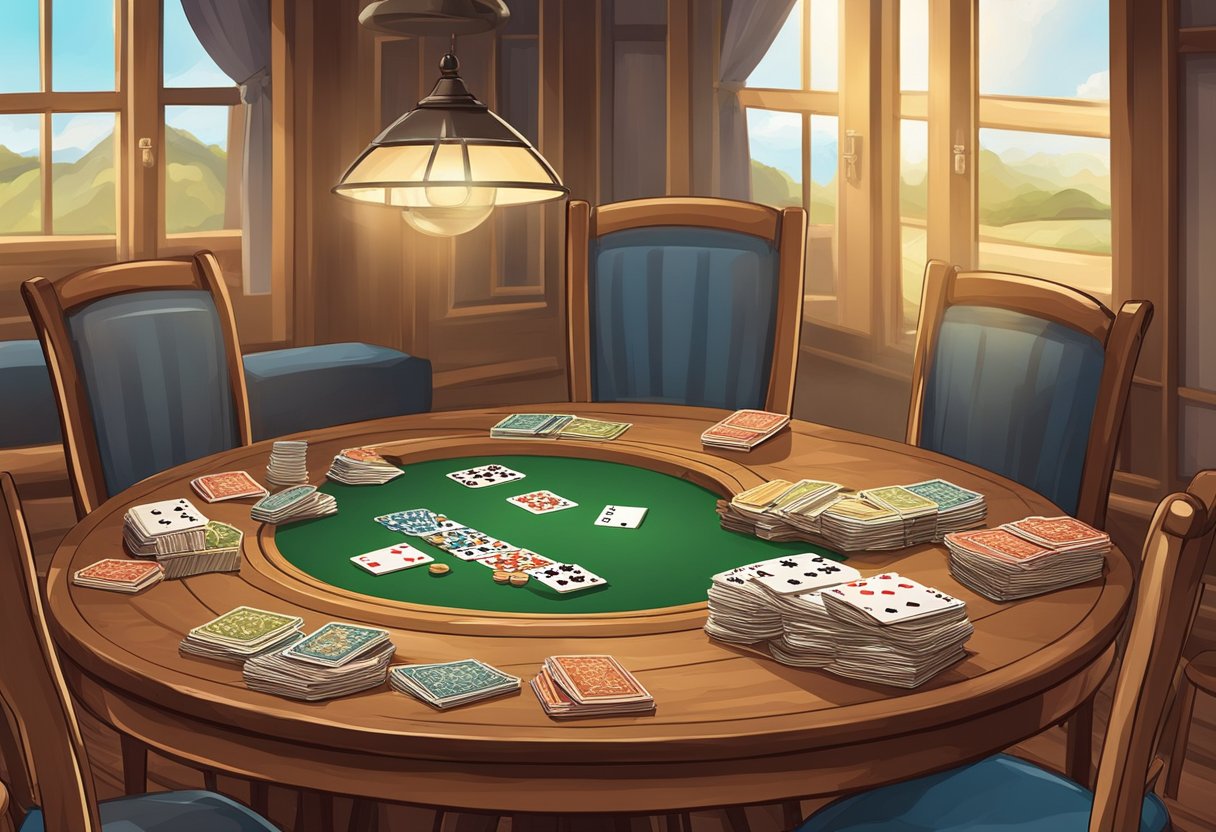Exploring card games as a hobby is like unlocking a treasure chest of entertainment, strategy, and social bonding. These games have transcended time and culture, giving rise to a rich tapestry of varieties that cater to all ages and skill levels.
Whether you prefer the tactical complexities of bridge or the fast-paced excitement of modern trading card games, this pastime offers something for everyone.

For those considering making card games a new hobby or seeking to deepen their appreciation for this form of play, practical considerations like learning the basics, gradually enhancing your strategies, and choosing the right card sets can enrich the experience.
As with any hobby, the more you immerse yourself, the more rewarding it becomes. Whether at a friend’s game night or through solitary play, card games offer a fulfilling way to engage your mind and connect with others.
Key Takeaways
- Card games offer diverse entertainment and mental benefits.
- They facilitate social interaction and enhance strategic skills.
- Understanding and practice improve the card gaming experience.
| See Also: What Are Some Tabletop Games? |
Historical Context of Card Games
Card games have a rich and diverse history, evolving from simple pastimes to intricate forms of entertainment across various cultures. The historical context of playing cards and card games provides insight into how they’ve become a deeply ingrained hobby worldwide.
Evolution of Playing Cards
Playing cards first appeared in Europe in the 14th century, with designs that were heavily influenced by Arabic motifs. These early playing cards featured symbolic illustrations and were often hand-painted, making them luxury items for the elite.
It’s believed that cards entered Europe via travelers who encountered them in the Middle East and Asia, where they may have originated.
Since these beginnings, playing cards have witnessed significant changes in both style and manufacturing. The printing revolution in the 15th century brought about the mass production of cards, allowing them to become more accessible to the general public.
As cards spread throughout Europe, regional designs emerged, giving rise to the various suits and deck structures we recognize today. For instance, the standard French deck with hearts, diamonds, clubs, and spades is widely used in many card games.
- Notable decks:
- Tarot playing cards
- Latin-suited decks
- German-suited decks
Notable Card Games Through the Ages
Over the centuries, numerous card games have risen to prominence, reflecting cultural preferences and social trends.
One of the most significant historical card games is Tarot, which originated for gameplay and was not associated with fortune-telling until much later.
See Also: Bucket List Of Hobbies From A – Z
Here are a few notable card games that have made a considerable impact through the ages:
- Ombre: Popular in 17th-century Europe and considered a game of high social standing.
- Whist: This game evolved into bridge and remains popular today.
- Poker: Gained fame in American culture with numerous variations.
- Blackjack: Known for its presence in casinos around the world.
The 1990s introduced trading card games like Magic: The Gathering, adding a collectible and strategic dimension to card gaming. You can see the breadth of diversity that exists among card games, from gambling staples at casinos to competitive trading card games.
Table: Influence of Card Games on Society
| Century | Impact |
|---|---|
| 14th – 15th | Cards introduced to Europe; luxury items |
| 15th | Mass production; wider social accessibility |
| 17th | Ombre as a societal pastime |
| 18th – 19th | Whist and bridge gain prominence |
| 20th – 21st | Poker and blackjack global expansion; rise of trading card games |
Card games have not only served as forms of entertainment but also as reflections of the societies they were played in. Whether you’re a history buff or a card game enthusiast, understanding the evolution and historical significance of card games can enhance your appreciation for this time-honored hobby.
The Basics of Card Gaming
Exploring card gaming involves understanding the variety of card decks available and the common rules that guide play.
Types of Card Decks
When you begin playing card games, you’ll primarily encounter the standard 52-card deck. This deck has four suits: hearts, diamonds, clubs, and spades, each with 13 ranks from the two (deuce) to ten, followed by the jack, queen, king, and ace. However, some games might use specialty decks like tarot cards or custom creations with unique themes and rules.
| Suit | Symbols | Cards per Suit |
|---|---|---|
| Hearts | ♥ | 13 |
| Diamonds | ♦ | 13 |
| Clubs | ♣ | 13 |
| Spades | ♠ | 13 |
Additionally, decks may vary in size. For instance, Pinochle uses a 48-card deck, and Canasta uses two full decks, including the jokers.
Common Rules and Objectives
Basic objectives in card games include accumulating points, completing certain combinations, or strategically outperforming your opponents.
You’ll find that some games focus on trick-taking, like bridge or hearts, where the goal is to win rounds, known as tricks, by playing a card that outscores the cards played by others.
Here are some widely recognized rules that many card games share:
- Card Hierarchy: Cards have different values. For example, an ace is generally high in games like poker.
- Turns: Play typically proceeds in a clockwise direction, with each player having a turn to play.
- Winning: The conditions to win can vary greatly; some games require the highest score, while others like go fish, involve matching cards.
In conclusion, engaging in the world of card gaming begins with a grasp of the types and layouts of decks in addition to finding familiarity with universal rules objectives.
Popular Card Games and Variations
Card games offer a diverse range of options for all types of players, from the time-tested classics that test strategy and skill to modern hits that bring fast-paced excitement to your game nights.
Classic and Traditional Games
Rummy: A family of matching-card games notable for similar gameplay based on matching cards of the same rank or sequence and same suit.
The basic goal in any form of rummy is to build melds which consist of sets, three or four of a kind of the same rank, or runs, three or more cards in sequence, of the same suit.
Solitaire: Often played individually, Solitaire involves sorting cards by suit and sequence into foundation piles. Klondike, the version often referred to simply as ‘Solitaire’, challenges you to clear all the cards from the table.
Bridge: This trick-taking game uses a standard deck of 52 cards and centers around four players forming two partnerships. With complex strategies involving bidding and card play, Bridge is a test of memory, tactics, and teamwork.
Poker: There are numerous poker variations, each with its own set of rules and strategies. Texas Hold’em, perhaps the most famous version, combines the uncertainty of which cards will appear with the certainty of your hand, challenging your ability to bluff and calculate odds on the fly.
Modern and Popular Card Games
Uno: A modern classic, Uno is a shedding-type card game where you match cards by color or number and play special action cards to thwart your opponents. The ultimate goal is to be the first to get rid of all your cards. Variations and themed versions of Uno keep the game fresh and exciting.
Modern variations of traditional games: Many classic card games have evolved with new rules and versions to fit modern playstyles. For instance, Sushi Go! is a fast-paced card game that introduces drafting mechanics, where players pick a card from a hand and pass it to the next player, creating a dynamic game environment.
Exploding Kittens and Cards Against Humanity stand out as unique creations that have sparked their own fervent fan bases. While fundamentally different in tone and gameplay, they both offer an innovative approach to what a card game can be in this era.
By engaging in these various card games, you can enjoy a vast spectrum of entertaining and cerebral experiences, either solo or with friends and family.
Card Games as Social Activities
Card games have long been a cornerstone of social interaction. They provide a framework for entertainment and camaraderie among players.
Playing Card Games with Friends
Spending time with friends can be both entertaining and meaningful when card games are involved. A game of poker or bridge often becomes the center of an evening, allowing you and your friends to challenge each other’s strategy and skill. Being well-versed in different card games can make you the life of the party and open doors to a variety of social circles.
- Benefits:
- Enhances social interaction: Engaging in card games creates an interactive environment.
- Cultivates competitive spirit: Friendly rivalry through card games can solidify friendships.
Card Games for Family Bonding
Family gatherings can be greatly enriched by incorporating card games, as they cross generational gaps and offer a way for the whole family to engage together. Whether it’s a classic game like Go Fish with the kids or a spirited round of Canasta, card games have a unique way of strengthening family ties.
- Advantages:
- Encourages teamwork: Families can team up and develop unity through certain card games.
- Provides educational opportunities: Many games help to develop math skills and strategic thinking.
| Tips for Family Card Nights | Description |
|---|---|
| Choosing the Right Game | Pick games that are age-appropriate and engaging for all family members. |
| Setting the Rules | Ensure everyone understands the rules to avoid confusion and frustration. |
| Creating a Regular Schedule | Having a dedicated card night can become a treasured family tradition. |
Remember, the goal is to foster fun and togetherness, whether you’re laughing over a playful game of cards or teaming up to outwit the opposing partnership.
Skills and Benefits of Playing Card Games

Playing card games is more than just a form of entertainment; it’s a hobby that can enhance various cognitive abilities and provide emotional well-being.
Cognitive and Educational Prospects
When you engage in card games, your brain is put through a healthy workout. Card games improve critical skills like memory and concentration, which are vital in daily life. For instance:
- Memory Enhancement: Remembering the cards played or the rules involves significant memory use, aiding in keeping your memory sharp.
- Strategic Thinking & Problem Solving: Many card games require forethought and the ability to predict opponents’ moves, thereby improving your strategic planning skills.
Here’s a simple breakdown of cognitive gains:
| Skill | Description |
|---|---|
| Analytical Thinking | Assessing hands and probabilities sharpens analytical skills. |
| Logical Reasoning | You learn to make decisions based on logic rather than guess. |
| Math Skills | Scoring and keeping track involves arithmetic skills. |
Playing cards is also an educational tool that introduces you to new concepts and cultures, considering the wide variety of traditional games from around the world.
Psychological and Emotional Benefits
Card games have a considerable impact on your psychological and emotional states. They provide:
- Stress Relief: Engaging in a game can be a relaxing escape from day-to-day stress.
- Social Interaction: Whether you play bridge, poker, or rummy, card games promote socialization, helping you to strengthen bonds and meet new people.
Moreover, engaging in a hobby like playing card games often contributes to improved self-esteem as you progress and win, and it’s a healthy way to engage in competitive fun. Learn about the psychological and social benefits of playing cards.
By incorporating card games into your routine, you not only have the chance to enjoy a multifaceted hobby but also to nurture valuable life skills.
Incorporating Card Games into Everyday Life

Card games can infuse fun and strategic thinking into your daily routine and provide unique entertainment during social events.
Card Games as Daily Rituals
Establishing card games as daily rituals can help you unwind and enhance your cognitive skills. You might start your morning with a quick game of solitaire, offering a calm moment before your day begins. Alternatively, family game nights could become a regular fixture, where games like rummy or hearts promote bonding and create cherished memories each week.
- Morning routine: A game of solitaire to kickstart the mind.
- Evening unwind: A round of blackjack to relax after work.
Social Gatherings and Special Events
Card games excel as a centerpiece for social gatherings and special events. They can break the ice at a party or serve as the main activity during a game night. For instance, poker can turn a casual get-together into a thrilling competition, whereas bridge can offer an engaging challenge at a more formal gathering.
Key occasions to incorporate card games:
- Birthday parties: Organize a tournament with prizes.
- Holidays: A festive-themed game night with variations on classic card games.
By integrating card games into your daily life and social events, you cultivate a hobby that is both entertaining and beneficial to your cognitive well-being.
Practical Considerations for Hobbyists

Entering the world of card games as a hobby combines the joy of strategic gameplay with the pleasure of collecting. Your journey as a hobbyist can be both rewarding and affordable, provided you consider a few practical aspects.
Starting a Card Game Hobby
To begin this hobby, all you need is a standard deck of cards—an investment that is relatively inexpensive. A diverse array of card games can be played alone or with others, catering to various interests and skill levels. Consider the following steps to get started:
- Purchase a Quality Deck: Opt for a sturdy, plastic-coated deck that can withstand frequent handling.
- Learn the Rules: Resources are available online, like Discover a Hobby, which offers guides and strategies for different games.
- Practice: Start with simpler games like Solitaire to build your skills before moving to more complex ones.
Maintaining and Expanding Your Collection
As you delve deeper into card games, maintaining and expanding your collection becomes part of the hobby. Pay attention to the following to enrich your experience:
- Care for Your Cards: Store them in a cool, dry place and consider card protectors for longevity.
- Join Communities: Being part of communities can lead to discovering new games and affordable ways to expand your collection.
- Cataloging: Keep a list of your games and decks. Here’s an example layout for tracking:
| Game Name | Deck Type | Number of Players | Skill Level Required |
|---|---|---|---|
| Poker | Standard | 2-10 | Intermediate |
| Bridge | Standard | 4 | Advanced |
| Cards Against Humanity | Specialty | 3-20 | Easy |
Incorporating card games into your leisure activities introduces a hobby that doesn’t demand a significant financial outlay. This pastime fosters social interactions and sharpens the mind, making for a fulfilling addition to your routine.
Conclusion

- Diverse Range: You’ll find a wide variety of card games to enjoy, each offering unique strategic depth.
- Skill Development: Sharpen your skills in observation, strategy, and psychology.
- Accessibility: Starting is easy with a simple deck of cards and potentially some free time.
- Social Interaction: Engage in a social atmosphere and bond over shared game experiences.
- Historical Significance: Gain appreciation for the centuries-old tradition of card playing.
- Mental Benefits: Keep your mind active and challenged.
Whether you seek casual fun or competitive play, card games remain a robust hobby choice.
| Additional Tabletop Game Hobbies | |
|---|---|
| Backgammon | Board Games |
| Bridge | Card Games |
| Checkers | Chess |
| Cribbage | Dominoes |
| Draughts | Gambling |
| Go | Mahjong |
| Poker | Shogi |
| Shuffleboard | Table Football |
| Wargaming |

